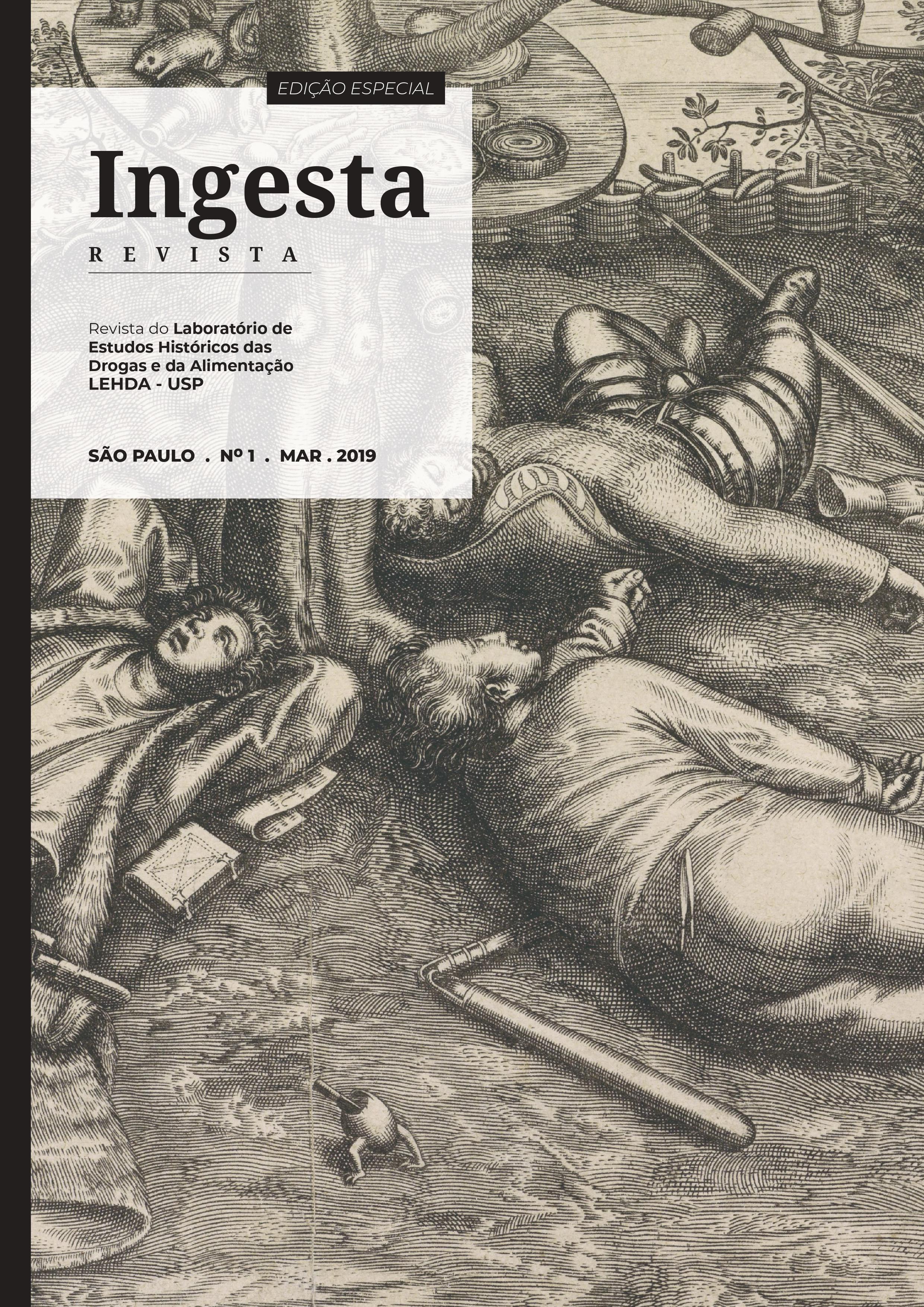Building a food model for Latin America
the entry of nutrition into the international health agenda (1921-1949)
DOI:
https://doi.org/10.11606/issn.2596-3147.v1i1p68-81Keywords:
Nutrition, International health, The League of Nations Health, Pan American Sanitary Bureau, The Institute of Nutrition of Central America of PanamaAbstract
The context of reframing the social concerns of the interwar period was marked by the creation of international institutions to “rationalize” scientific knowledge about food. Under the justification that only economic growth would help and incorporate people into the global economic community, the first food assistance policies coordinated by national states and new international institutions such as the Pan American Sanitary Bureau, The Health Organization of the League of Nations and The Institute of Nutrition of Central America of Panama. In this article we will analyze the links in the science of nutrition under construction in these policies for Latin America in interaction with the scientific traditions about food, mainly of the United States and Canada, observing these measures based on a series of actions in the field of international health.
Downloads
References
BARONA, Josep L. Nutrition and health. The international context during the inter-war crisis. Social History of Medicine, v. 21, n. 1, pp. 87–105, 2008.
BARROS, Maria Sylvia; TARTAGLIA, José Carlos. A política de alimentação e nutrição no Brasil: breve histórico, avaliação e perspectivas. Alimentos e Nutrição, Araraquara, v. 14, n. 1, pp. 109-121, 2003. BIRN, Anne-Emanuelle. O nexo nacional-internacional na saúde pública: o Uruguai e a circulação das políticas e ideologias de saúde infantil, 1890-1940. História, Ciências, Saúde – Manguinhos,
Rio de Janeiro, v. 13, n. 3, pp. 675-708, jul.-set. 2006.
BIZZO, Maria Letícia Galluzzi. Agências internacionais e agenda local: atores e ideias na interlocução
entre nutrição e país (1932-1964). Tese (Doutorado em História das Ciências e da Saúde) –
Casa de Oswaldo Cruz/Fundação Oswaldo Cruz. Rio de Janeiro, 2012.
BOROWY, Iris. Coming to terms with world health: the League of Nations Health Organization, 1921-
1946. Frankfurt: Peter Lang, 2009.
DRINOT, Paulo. Food, race, and working-class identity: restaurantes populares and populism in
Peru. The Americas, v. 62, n. 2, pp. 245-270, out. 2005.
FERREIRA, Luiz Otávio. Negócio, política, ciência e vice-versa: uma história institucional do
jornalismo médico brasileiro entre 1827 e 1843. História, Ciências, Saúde – Manguinhos, Rio de
Janeiro, v. 11 (suplemento 1), pp. 93-107, 2004.
FLANDRIN, Jean Louis; MONTANARI, Massimo. História da alimentação. São Paulo: Estação
Liberdade, 1998.
GARCIA, Monica. Mortality rates or sociomedical indicators? The work of the League of Nations on
standardizing the effects of the Great Depression on health. Health Policy and Planning, v. 29,
n. 1, pp. 1–11, jan. 2014.
HOWARD, Leathers; FOSTER, Phillips. The world food problem: tackling the causes of undernutrition
in the Third World. Boulder: Lynne Rienner Publishers, 2004.
HOWARD-JONES, Norman. The scientific background of the International Sanitary Conferences, 1851-
1938. Genebra: World Health Organization, 1975.
HURBITUSE, R. Aide alimentaire et pauvreté: vers de nouvelles formes de priorisation des clientèles
et des interventions. In: LABERGE, D. (Dir.), L’errance urbaine. Sainte-Foy: Les Éditions
MultiMondes, 2000; pp. 347-359.
JENSEN, Richard. Nationalism and civic duty in wartime: comparing world war in Canada and
America. Canadian Issues, pp. 6-19, dez. 2004.
LATOUR, Bruno. Ciência em ação: como seguir cientistas e engenheiros sociedade afora. São Paulo:
Editora Unesp, 1999.
MILANESIO, Natalia. Food Politics and Consumption in Peronist Argentina. Hispanic American Historical Review, v. 90, n. 1, pp. 75-108, fev. 2010.
MUNIZ, Érico Silva. Comida, trabalho e assistência social: a alimentação na agenda política brasileira
(1939-1947). Tese (Doutorado em História das Ciências e da Saúde) – Casa de Oswaldo Cruz/
Fundação Oswaldo Cruz. Rio de Janeiro, 2014.
OCHOA, Enrique C. Feeding Mexico: the political uses of food since 1910. Wilmington: Scholarly
Resources, 2000.
OLIVEIRA, Nemuel da Silva; MAIO, Marcos Chor. Estudos de comunidade e ciências sociais no Brasil.
Sociedade e Estado, Brasília, v. 26, n. 3, pp. 521-550, set./dez. 2011.
RODRIGUES, Jaime. Alimentação, vida material e privacidade: uma história social de trabalhadores em
São Paulo nas décadas de 1920 a 1960. São Paulo: Alameda, 2011.
RODRÍGUEZ-OCAÑA, Esteban; ZYLBERMAN, Patrick. Improving public health amidst crises.
Introduction. Dynamis, Granada, n. 28, pp. 19-27, 2008.
RUXIN, Joshua Nalibow. Hunger, science and politics: FAO, WHO and Unicef nutrition policies, 1945-
1978. Tese (Doutorado) – University of London. London, 1996.
SCRIMSHAW, Nevin S. History and early development of INCAP. The Journal of Nutrition, v. 140, n. 2,
pp. 394-6, fev. 2010.
STAPLES, Amy L. S. The birth of development: how the World Bank, Food and Agriculture Organization,
and the World Health Organization changed the world, 1945–1965. Kent: Kent State
University Press, 2006.
VERNON, James. Hunger: a modern history. Cambridge/Massachusetts/Londres: The Belknap Press
of Harvard University Press, 2007.
WEINDLING, Paul. The role of international organizations in setting nutritional standards in the
1920s and 1930s. In: KAAMMINGA, Harmke; CUNNINGHAM, Andrew (Eds.). The science and culture of nutrition, 1840-1940. Clio Medica, The Wellcome Institute Series in the History of Medicine. Amsterdã/Atlanta: Editions Rodopi B.V, 1995; pp. 319-332.
Downloads
Published
Issue
Section
License
1. Authors retain the copyright and grant the journal the right of first publication, with the work simultaneously licensed under the Creative Commons Attribution License which allows the sharing of work with acknowledgment of authorship and initial publication in this journal.
2. Authors are authorized to take additional contracts separately, for non-exclusive distribution of the version of the work published in this journal (eg. publish in institutional repository or as a book chapter), with acknowledgment of authorship and initial publication in this journal.
3. Authors are allowed and encouraged to publish and distribute their work online (eg. in institutional repositories or on their personal page) at any point before or during the editorial process, as this can generate productive changes as well as increase the impact and the citation of the published work (See The Effect of Free Access).


